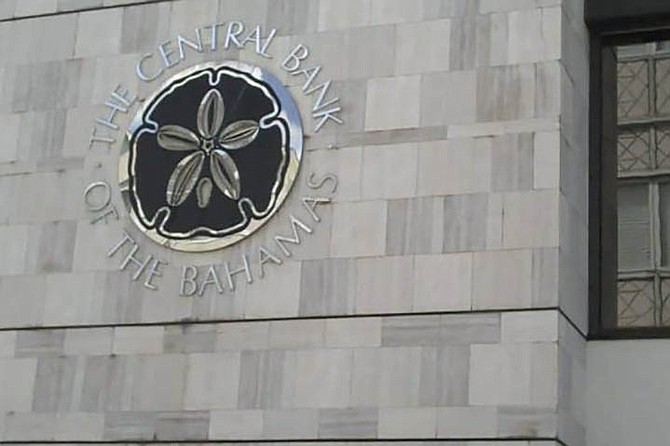By NEIL HARTNELL
Tribune Business Editor
nhartnell@tribunemedia.net
“Deferred” commercial banks loans have decreased by more than $1.6bn since COVID-19’s peak, a senior Central Bank official has revealed, while denying that the sector is “over-regulated”.
Karen Rolle, a Central Bank deputy inspector, told the Grand Bahama Business Outlook conference that private sector credit still on deferral has reduced by around 88.4 percent since last June when the total sum stood at around $1.85bn.
That accounted then for around one-third of all outstanding commercial bank credit to businesses, households and individual borrowers, but Ms Rolle said most deferrals - which had typically lasted between three to six months - had come to an end when 2020 closed.
While commercial banks were continuing to support struggling borrowers, especially those linked to the tourism industry, on a case-by-case basis, she revealed that the amount of credit on deferral at year-end 2020 had shrunk to just $471.8m or 8.5 percent of total loans outstanding to the private sector.
And this had decreased further, more than halving over the first three months of 2021, to end the first quarter at $215.3m or 5.1 percent of total outstanding loans. “We expect to see a continued downward trend with those numbers as more and more furloughed employees return to the workforce, and the pressure on household incomes eases,” Ms Rolle added.
While that will depend on the progress made by The Bahamas and rest of the world in fighting COVID-19, especially given the uptick in the local infection rate, she said that despite the pandemic’s devastating economic fall-out “it’s not a doom and gloom” scenario for the commercial banking sector and rest of the financial services industry.
Describing the situation as “an evolving story”, Ms Rolle said the Central Bank had been quick to implement measures to strengthen the external reserves and protect the financial services industry’s resilience when COVID-19 struck in March 2020.
The sector, she added, still consists of 217 banks and trust companies with $173bn in collective assets; a domestic banking industry with $15.2bn in assets, of which $11bn are local, and $7.3bn in deposits; credit unions with 45,467 members and $482.3m in assets; five money services providers with $18m in combined assets; and three payment services providers with $10m.
Ms Rolle said the Central Bank had immediately instructed all its licensees and regulated entities to initiate their Business Continuity Plans (BCPs) once the pandemic and associated restrictions arrived, given the limited access to their offices. Commercial banks were also told to offer limited branch services to prevent COVID-19’s spread.
The regulator also provided “a grace period” for statutory and supervisory filings that were due, while suspending the payment and repatriation by the Canadian-owned commercial banks to their foreign parents as a means to preserve foreign currency reserves.
Ms Rolle said 2020 also reversed the decline in non-performing loans that the commercial banking sector had seen pre-COVID, with such delinquent credit increasing by $20.6m or 4.5 percent for the year to $474.6m.
She added that commercial banks also wrote-off $145m worth of losses against their profits last year, while loan loss provisioning levels had “risen by one-third compared to pre-COVID levels”. However, the industry’s capital levels remained “robust” with a risk weighted average of 28 percent and Common Tier One capital, as a percentage of risk-weighted assets, standing at a 26 percent average.
Both, Ms Rolle said, were above the Central Bank’s “target” and “trigger” ratios of 17 percent and 14 percent, respectively. “Banks were holding more than enough capital,” she added. “Capital provides a cushion to support losses during periods of stress.
“The domestic banks remain highly liquid and able to withstand withdrawals of large deposits.” While acknowledging that financial services and the wider economy “are not out of the woods yet, thus far we have withstood a significant storm. While domestic banks are likely to face challenges in the near term, they themselves are not at risk of stress”.
While there were “less buffers” around the credit unions, Ms Rolle said they posed “no systemic risk” due to their smaller balance sheets and the fact Deposit Insurance Corporation protection now covers their clients.
Responding to concerns that financial services is over-regulated, she denied this and said The Bahamas had at all times “to ensure its reputation as an international financial centre is maintained” by complying with global standards. Ms Rolle added that regulators sought “to claw back” and simplify supervisory requirements wherever it was appropriate.





Comments
tribanon 4 years, 9 months ago
Loan deferrals are down, but loan delinquencies and write-offs against previously established loan loss provisions are up.
birdiestrachan 4 years, 9 months ago
There is a five-dollar charge to have a saving account each month and the teller told me to make a deposit the charge is $2,80.
The interest rate is nothing really.
All are on a slow move to hell.
Sign in to comment
OpenID